Synopsis
In the summer of 1934, young lovers Bernard and Jean head to the five star Grand Hotel in Eastbourne for a dirty weekend. Bernard comes from an affluent middle-class family while Jean works at the local post office; they intend to be married within a matter of months, much to the annoyance of Bernard's domineering mother.
During their stay the couple make the acquaintance of the resident dance band singer Jack Butcher, who takes a particular liking to Jean. When Bernard receives word that his father has died he returns home immediately to be at his mother's side, leaving Jean alone at the hotel. Hurt by Bernard's abandonment, Jean goes to console herself in the ballroom, where she is approached by Butcher who plies her with alcohol before taking her back to her room, where the two have sex. Despite Bernard's mother's objections to her son marrying a shop girl, Bernard returns to the hotel and marries Jean soon after.
In the summer of 1980, the elderly Bernard and Jean return to the hotel to rekindle the spark in their marriage. Bernard's earlier class-driven condescension towards Jean has turned to cruelty, constantly examining and cross-examining every comment she makes; Jean's earlier naivety and impetuousness have transformed into resignation and tolerance, despite her husband's maliciousness. The hotel has also changed since the couple last stayed there: the orchestra who once played to the residents as they took their afternoon tea has been replaced by a man on an electronic keyboard, and the ballroom holds discos rather than dances.
Bernard and Jean spend much of their holiday arguing, usually as a result of Bernard's imagined slights from his wife. Time, however, is running out and the couple are aware that with Bernard being in ill-health this may prove to be the last holiday they take together. On the final evening of their stay the couple attend a 1930s night. Bernard's mind travels back to their first time at the hotel; the rush of memory causes him to recognise the legacy of his mother's dominance, the love he once had with Jean, the significance of Jack Butcher and his own loneliness. He attacks Jean but suffers a heart attack. As St John's Ambulance men remove his body the rock band on stage launch into a rendition of "Button Up Your Overcoat".
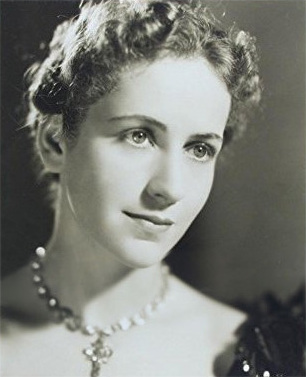
Dame Edith Margaret Emily Ashcroft, known professionally as Peggy Ashcroft, was an English actress whose career spanned more than 60 years.

John Jacob "Jack" Sugden is a fictional character from the British ITV soap opera Emmerdale. The character was originally played by Andrew Burt from 1972 to 1973 with a brief return in 1976, when the actor left for Italy to write a book. On his return in 1980 he was played by Clive Hornby. Hornby remained in the role until 2008 when he was forced to take a break from Emmerdale due to illness. His last on-screen appearance was on 21 February 2008, and his absence was explained by the character visiting his mother, Annie Sugden in Spain. Although Hornby was intended to return, he died from his illness in July 2008 without returning to the programme. Jack was written out following Hornby's death, dying off-screen of a heart attack in February 2009.

Lionel Charles Jeffries was an English actor, director, and screenwriter. He appeared primarily in films and was nominated for a Golden Globe Award for his role in The Spy with a Cold Nose.

Michael John Elphick was an English film and television actor. He played the eponymous private investigator in the ITV series Boon and Harry Slater in BBC's EastEnders. He was nominated for a BAFTA Award for Best Supporting Actor for his performance in the 1983 film Gorky Park. With his gruff Sussex accent and lip-curling sneer, he often played menacing hard men.

Josephine Margaret Warne, better known as Jo Warne, was an English actress, who briefly played Peggy Mitchell in the BBC soap opera EastEnders, making her first appearance on 30 April 1991. She appeared in a total of 10 episodes between April and July 1991, as part of Sam Mitchell and Ricky Butcher's teen elopement storyline. Barbara Windsor later took on the full-time role of Peggy until the character's death in 2016.

Aunt Sal is a recurring fictional character in the BBC soap opera EastEnders, played by Anna Karen Introduced in 1996, she appeared sporadically from 21 March 1996 until 29 December 1997, then from 28 September 2001 until 17 September 2004, 19 July 2007 until 4 April 2011 and 22 November 2013 to 20 January 2017. She appears for just a few episodes at a time and has been collectively featured in 58 episodes of the show.
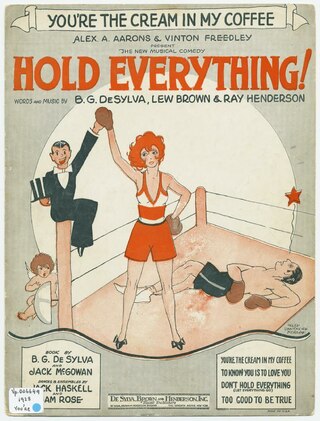
"You're the Cream in My Coffee" is a popular song published in 1928. Hit recordings were by Annette Hanshaw, Ben Selvin, Ted Weems and Ruth Etting.

Annie Sugden is a fictional character from the British television soap opera Emmerdale. She was played by Sheila Mercier as a regular character between 1972 and 1994, with occasional guest appearances in the show after her original departure. Mercier cut back on location filming during the late 1980s and eventually left the serial in 1994 due to the gruelling schedule. Annie was one of Emmerdale's original characters, appearing in its first episode on 16 October 1972 and became the longest serving female character in the series' history. She was the soap's "first matriarch", the maternal force behind the Sugden family, who were collectively one of Emmerdale's main focal points.
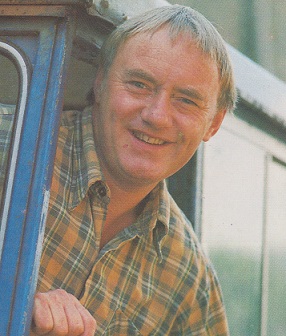
Matt Skilbeck is a fictional character from the British television soap opera Emmerdale, played by Frederick Pyne. He is one of the series' original characters and made his debut in the first episode broadcast on 16 October 1972. Pyne was interviewed for the role in 1971 and cast the following year. He came into the show with farming knowledge and an expectation that he would only be in it for five years. Matt is a sheep farmer and married to Peggy Skilbeck at the beginning of the serial. Matt is characterised as mild-mannered, honest, and stubborn, although Pyne thought his character was too nice. Following Peggy's death and those of his children, Matt marries barmaid Dolly Acaster. A change in Matt's personality occurs when quarry owner Harry Mowlem makes advances towards Dolly and Matt attacks him, leading to his arrest for Mowlem's murder. Pyne decided to leave Emmerdale in 1989 to pursue work in the theatre. He was unhappy that the writers chose to split Matt and Dolly up, as they had been one of the few remaining happy families in soap at the time.
John Charles Wilsher is an English television screenwriter and playwright, best known for dramas relating to the police and law enforcement such as long-running procedural The Bill. His highest profile work was as creator of Between the Lines, which screened in the UK between 1992 and 1994.
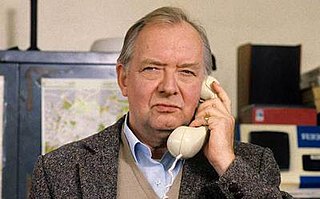
David John Ryall was an English stage, film and television character actor. He had leading roles in Lytton's Diary and Goodnight Sweetheart, as well as memorable roles in Dennis Potter's The Singing Detective and Andrew Davies's adaptation of To Play the King. He also portrayed Billy Buzzle in the ITV sitcom Bless Me, Father and Frank in the BBC sitcom Outnumbered.
The Mitchell family is a fictional family in the UK soap opera EastEnders. They were first introduced in February 1990, when brothers Phil and Grant Mitchell bought the local garage, the Arches. Their sister Sam was introduced later in 1990, and their mother Peggy shortly after in 1991, before being reintroduced as a regular character in 1994, with the role recast to Barbara Windsor. Since then, the family has been significantly expanded to include both the immediate and extended families. Phil has been the longest running Mitchell on the show, and the family has expanded significantly in the years since, remaining a large presence on the square.
Where Adam Stood is a television play by Dennis Potter, first broadcast on BBC 2 in 1976. It is a free adaptation, wholly shot on film, of Edmund Gosse's autobiographical book Father and Son (1907).

Blade on the Feather is a television drama by Dennis Potter, broadcast by ITV on 19 October 1980 as the first in a loosely connected trilogy of plays exploring language and betrayal. A pastiche of the John Le Carré spy thriller and transmitted eleven months after Anthony Blunt was exposed as the 'fourth man', the drama combines two of Potter's major themes: the visitation motif and political disillusionment. The play's title is taken from "The Eton Boating Song".
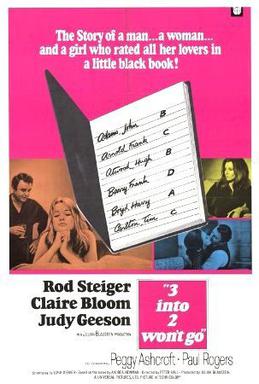
Three into Two Won't Go is a 1969 British drama film directed by Peter Hall and starring Rod Steiger, Claire Bloom and Judy Geeson. The film was entered into the 19th Berlin International Film Festival.
Kenith Trodd is a British television producer best known for his professional association with television playwright Dennis Potter.

Moonlight on the Highway is a television play by Dennis Potter, first broadcast on 12 April 1969 as part of ITV's Saturday Night Theatre strand. The tale of a young Al Bowlly obsessive attempting to blot out memories of sexual abuse via his fixation with the singer, the play was the first of Potter's works to use popular music as a dramatic device and strongly anticipated Potter's later 'serials with songs' Pennies from Heaven (1978), The Singing Detective (1986) and Lipstick on Your Collar (1993).
Rain on the Roof is a television drama by Dennis Potter, broadcast by ITV on 26 October 1980.













